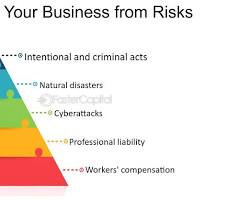Choosing the right types of business insurance is crucial for protecting your company from various risks and ensuring long-term success. Depending on the nature of your business, here are the essential types of business insurance you should consider:
1. General Liability Insurance
This is one of the most important types of insurance for all businesses. It provides coverage for common risks such as:
- Property damage or injury caused by your business operations
- Legal defense costs and settlements if your business is sued for causing harm to someone or damaging their property
- Protection against advertising mistakes, like copyright infringement or slander
2. Property Insurance
Property insurance protects your business assets, including buildings, equipment, inventory, and furniture, from risks like fire, theft, vandalism, and natural disasters (if not excluded). Even if you operate from home or a rented office, this coverage is crucial to safeguard physical assets.
3. Workers’ Compensation Insurance
If you have employees, workers’ compensation insurance is typically required by law in most states. It covers medical expenses and lost wages for employees who get injured or sick as a result of their work. It also protects your business from lawsuits filed by injured employees.
4. Professional Liability Insurance (Errors and Omissions)
This type of insurance is essential for businesses that provide services or advice. It covers:
- Claims related to mistakes, errors, or omissions in the services you offer
- Lawsuits alleging negligence, failure to deliver promised services, or issues arising from professional advice This is especially important for industries like consulting, legal services, and technology firms.
5. Business Interruption Insurance
Business interruption insurance helps cover lost income and operating expenses if your business is forced to close temporarily due to a disaster (like a fire or a natural catastrophe). It helps keep your cash flow steady during downtime and covers ongoing costs like rent and utilities.
6. Commercial Auto Insurance
If your business owns vehicles or requires employees to drive for business purposes, commercial auto insurance is essential. It covers accidents, vehicle damage, theft, and liability if employees use company cars, trucks, or vans. This insurance is especially important for businesses that rely on transportation (e.g., delivery or service businesses).
7. Cyber Insurance
As businesses increasingly rely on digital platforms, cyber insurance has become essential. It protects your company from:
- Data breaches or cyberattacks
- Loss of sensitive customer information
- Costs related to restoring systems, public relations efforts, and any legal consequences resulting from a breach
8. Product Liability Insurance
If your business manufactures or sells products, product liability insurance is vital. It protects your company from claims related to defects in the products you sell that cause injury, damage, or harm to customers. This coverage is especially important for manufacturers, retailers, and wholesalers.
9. Directors and Officers Insurance (D&O)
This insurance protects your company’s leadership (directors and officers) from personal liability in case they are sued for decisions or actions taken in their official capacity. It covers defense costs, settlements, and judgments if the company’s executives are accused of wrongdoing, such as negligence, breach of duty, or mismanagement.
10. Employment Practices Liability Insurance (EPLI)
EPLI covers your business against claims made by employees regarding issues like:
- Discrimination, harassment, and wrongful termination
- Breach of employment contracts or failure to promote
- Wage and hour violations This is especially important for businesses with employees, as employment-related claims can be costly.
11. Health Insurance for Employees
Offering health insurance benefits to your employees is not just a good practice but, in many cases, a requirement (depending on your company size and location). Health insurance plans provide coverage for medical expenses and help attract and retain talent. Businesses with more than 50 full-time employees are generally required by law (in the U.S.) to offer health insurance under the Affordable Care Act (ACA).
12. Commercial Umbrella Insurance
Commercial umbrella insurance offers additional liability coverage beyond the limits of your other policies, such as general liability or commercial auto insurance. It helps protect your business in case of major claims or lawsuits that exceed the coverage limits of your primary insurance policies.
Conclusion:
The specific insurance needs of your business will vary depending on the size, industry, and the risks you face. However, the types mentioned above are generally considered essential for most businesses. Always assess your company’s unique needs and consult with an insurance professional to tailor your coverage to ensure maximum protection for your assets, employees, and operations.





